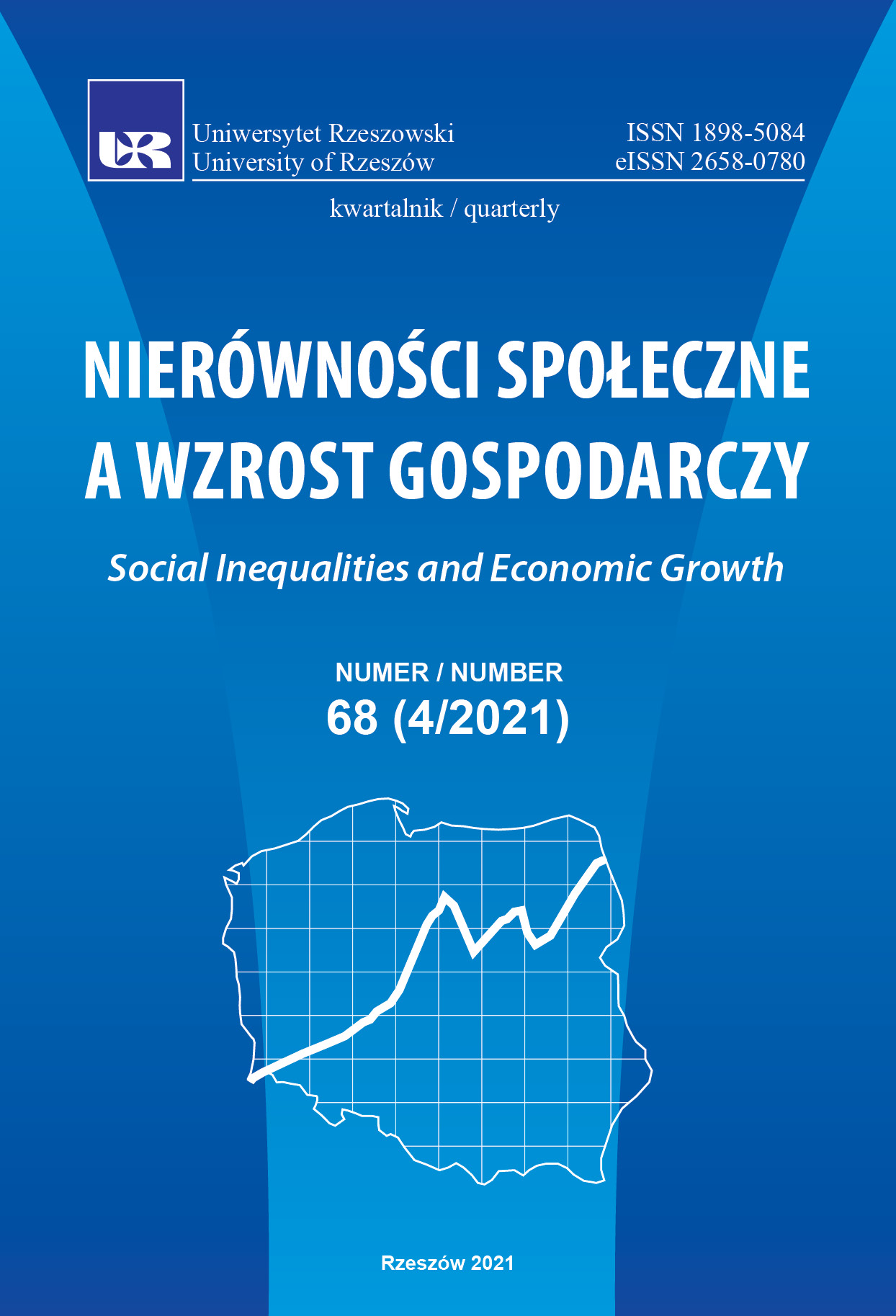Financialization and financial problems of enterprises in the Visegrad Group countries
DOI:
https://doi.org/10.15584/nsawg.2021.4.9Keywords:
financial activities, the Visegrad Group, financialization, financial processes, bankruptcy of enterprisesAbstract
Financialization is currently an issue frequently discussed in the literature on the subject. This process, often perceived as an expansion of the financial sphere that penetrates various aspects of the economy, also has an increasing impact on the functioning of non-financial enterprises, which, on the surface, may appear to be entities that might not expect to be affected by this process. The article deals with the issue of financialization and its impact on the running of economic activities for enterprises operating in the economy. The literature frequently expresses the view that the increasing level of processes related to financialization has a negative impact on the conduct of business activity by enterprises, which in extreme cases results in their bankruptcy. Therefore, this research attempts to determine how the advancement of financial processes, or financialization, in an economic entity affects its financial situation (results). To achieve this objective, the following research hypothesis was formulated: A high level of financialization increases the probability of problems related to bankruptcy processes. To verify the research hypothesis and the purpose, a survey was conducted on all companies with financial data in the Orbis database from countries in the Visegrad Group. Furthermore, financial data for the years 2009–2018 was analyzed. The research tools used for this purpose are referred to (assumed) in the literature as measures of assessing the level of financialization. The results obtained through the study do not give a clear answer confirming the hypothesis set out at the beginning of the article. One important conclusion that can be drawn from the research is that the Visegrad Group countries are not characterized by a very high level of financialization, and it can be presumed that there are few noticeable negative symptoms of financialization. Moreover, there is a correlation between the increase in indicators considered characteristic of financialization and the unfavorable financial situation of non-financial enterprises.
Downloads
References
Aalbers, M. B. (2019). Financialization. W: D. Richardson, N. Castree, M. F. Goodchild, A. L. Kobayashi, R. Marston (red.), The International Encyclopedia of Geography: People, the Earth, Environment, and Technology (s. 1–14). Oxford: Wiley.
Alami, I. (2020). Money Power and Financial Capital in Emerging Markets: Facing the Liquidity Tsunami. RIPE Series in Global Political Economy, Routledge: Oxon and New York.
Banaszyk, P. (2015). Jak odwrócić finansyzację. Dziennik Gazeta Prawna, 14, 22 lipca.
Cournède, B., Denk, O. (2015).‘Finance and income inequality in OECD countries. OECD Economics Department Working Paper, 1224, 1–41. DOI: 10.1787/5js04v5jm2hl-en.
Cournède, B., Denk, O., Hoeller, P. (2015). Finance and inclusive growth. OECD Economic Policy Paper, 14, 1–46.
Dec, P. (2016). Demografia przedsiębiorstw – analiza ilościowa upadłości w Polsce i na świecie. Ekonomika i Organizacja Przedsiębiorstwa, 1(792), 101–117.
Foster, J. B. (2007). The Financialization of Capitalism. Monthly Review, 58(11), 1–12. DOI: 10.14452/MR-058-11-2007-04_1.
Gemzik-Salwach, A., Opolski, K. (red.). (2020). Gospodarka i społeczeństwo w dobie finansjalizacji. Warszawa: CeDeWu.
Glick, R., Lansing, K. J. (2010). Global Household Leverage, House Prices, and Consumption. FRBSF Economic Letters, 1, 1-5.
Gostomski, E. (2014), Finansyzacja w gospodarce światowej. International Business and Global Economy, 33, 299–311. DOI: 10.4467/23539496IB.13.021.2406.
Gulski, B. (2018). Finansyzacja jako czynnik wpływający na zawłaszczanie wartości przez przedsiębiorstwa. Studia i Prace Kolegium Zarządzania i Finansów, 160, 79–97. DOI: 10.33119/SIP.2018.160.5.
Hall, S. (2009). Finacialised Elites and the Changing Nature of Finance Capitalism: In vestment Bankers in London’s Finacial District. Competition & Change, 2, 173–189. DOI: 10.1179/102452909X417042.
Höpner, M. (2001). Corporate Governance in Transition: Ten Empirical Findings on Shareholder Value and Industrial Relations in Germany. Max Planck Institute for the Study of Societies. Working Paper, 5, 1–61. DOI: 10.2139/ssrn.287460.
Jajuga, K. (2014). W poszukiwaniu miar ryzyka finansowego. W: J. Czekaj, S. Owsiak (red.), Finanse w rozwoju gospodarczym i społecznym (s. 147–157). Warszawa: PWE.
Kowalczyk, D., Woźniak, H. (2020). Procesy finansjalizacji gospodarki światowej. Wybrane zagadnienia. Sopot: Centrum Myśli Strategicznych.
Lansing, K. J. (2012). Speculative growth, overreaction, and the welfare cost of techno logy-driven bubbles. Journal of Economic Behavior & Organization, 83, 461–483. DOI: 10.1016/j.jebo.2012.02.011.
Lazonick, W. (2011). From Innovation to Financialization: How Shareholder Value Ide ology is Destroying the US Economy. Massachusetts: University of Massachusetts and The Academic-Industry Research Network.
Lazonick, W., O’Sullivan, M. (2000). Maximizing Shareholder Value: A New Ide ology for Corporate Governance. Economy and Society, 29(1), 13–35. DOI: 10.1080/030851400360541.
Lewicka-Strzałecka, A. (2015). Kultura finansjalizacji. Prakseologia, 257(2), 209–230.
Morin, F. (2000). A Transformation in the French Model of Shareholding and Manage ment. Economy and Society, 29(1), 36–53. DOI: 10.1080/030851400360550.
Nölke, A., Perry, J. (2007). The Power of Transnational Private Governance: Financializa tion and the IASB. Business and Politics, 9(3), 1–25. DOI: 10.2202/1469-3569.1185.
Orhangazi, O. (2008). Financialization and Capital Accumulation in the Non-financial Corporate Sector: A Theoretical and Empirical Investigation on the US Economy: 1973–2003. Cambridge Journal of Economics, 32, 863–886. DOI: 10.1093/cje/ben009.
Palley, T. (2007). Financialisation. What It Is and Why It Matters, The Level Economics Institute. Washington D. C., Working Paper, 525, 1–31. DOI:10.2139/ssrn.1077923.
Potocki, T., Opolski, K. (2017). The macroeconomic determinants of financial literacy in the European Union (on the example of numeracy skills). W: K. Opolski, A. Gemzink-Sal wach (red.), Financialization and the Economy (s. 67–80). London: Routledge.
Ratajczak, M. (2012). Finansyzacja gospodarki. Ekonomista, 3, 281–301.
Ratajczak, M. (2017). Finansjalizacja gospodarki: wymiary dyskusji. Bezpieczny Bank, 3(68), 7–22. DOI: 10.26354/bb.2.3.68.2017.
Salento, A., Masino, G., Berdicchia, D. (2013). Financialization and Organizational Changes in Multinational Enterprises. Revue d’économie Industrielle, 144-4e tri mestre, 151, 145–176. DOI: 10.4000/rei.5710.
Skott, P., Ryoo, S. (2008). Macroeconomic implications of financialization. Cambridge Journal of Economics, 32, 827–862. DOI: 10.1093/cje/ben012.
Stockhammer, E. (2013). Financialization and the Global Economy. W: M. H. Wolfson, G. H. Epstein (red.), The Political Economy of Financial Crises (s. 512–525). New York: Oxford University Press.
Szczepankowski, P. (2015). Wpływ zarządzania wartością na finansjalizację przedsiębiorstw. Zeszyty Naukowe Uniwersytetu Szczecińskiego, 854. Finanse, Rynki Finansowe, Ubezpieczenia, 73, 497–510.
Downloads
Published
How to Cite
Issue
Section
License

This work is licensed under a Creative Commons Attribution-ShareAlike 4.0 International License.


